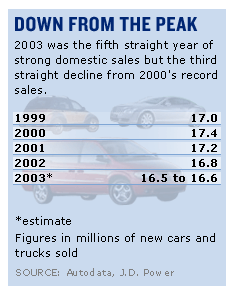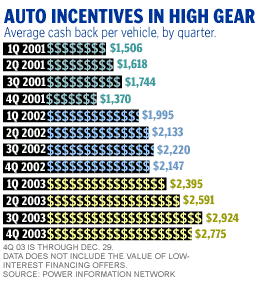DETROIT (CNN/Money) -
After three years in reverse, the auto industry hopes and believes it's ready to move forward once again.
It's not that the year that just ended was a particularly bad one for the industry. When final figures are reported Monday, the industry will have sold somewhere between 16.6 million and 16.7 million vehicles in the United States -- the sixth best year in industry history. But that marked a decline in sales and the Big Three automakers -- General Motors Corp., Ford Motor Co. and DaimlerChrysler's Chrysler Group -- lost market share.

But as executives gather in Detroit this week for the North American International Auto Show, they can see some positives in the 2003 numbers. They say that the drop in sales can be attributed to the first half of the year, when the economy and employment outlook were still relatively weak and there were concerns about a war in Iraq.
"Considering all the headwinds you had to deal with in the early part of the year, I think it turned out rather well," said Burnham Securities auto analyst David Healy.
Sales in the second half of the year were stronger. Sales were about a million vehicles above the first half, at an annual rate. Automakers are hopeful that sales will show an actual improvement in 2004. But they caution that gains will likely be modest, not like the booms that took place in some past economic recoveries. That's partly because the industry saw relatively strong sales throughout the economic downturn, tempering the impression made by any upturn.
"Probably the reason why '03 was lower than '02, and the reason that we don't think '04 will is necessarily going to be a blockbuster, is despite these good economic data coming in, we sold so many cars using incentives in '01 and '02, we didn't get the spring board effect you usually see," said George Pipas, Ford's manager of sales analysis.
Pushing back the big push
Incentives were up in 2003 as well, continuing an upward trend that started in the wake of the Sept. 11, 2001, terrorist attacks. The average cash back per vehicle reached nearly $3,000 in the third quarter. While they abated a bit in the fourth quarter when sales had help from the sell-off of 2003 models and the rollout of the 2004's, it's not clear if the Big Three will finally start to reduce incentives in 2004.

GM Chairman and CEO Rick Wagoner said last month that he believes new models and a stronger economy will allow for the roll-back of incentives this year. GM's first marketing effort for 2004, unveiled Sunday, is built around giving away 1,000 new vehicles to people who visit dealerships in the next two months, rather than on cash-back or low-interest financing offers on almost every vehicle. (For more on this most recent GM incentive plan, click here.)
A survey of 100 top auto executives from around the world by Big Four accounting firm KPMG found only 38 percent expect to increase the use of incentives this coming year, compared with 48 percent who were expecting an increase a year ago, and 63 percent who saw an increase coming in the survey conducted two years ago.
"They think incentives will be leveling off. With all the new models being launched in next 12 to 18 months, they will not need incentives to spur sales," said Brian Ambrose, national industry director of KPMG's automotive practice.
Others say that if incentives do actually decline, it's because the Big Three are now willing to let sales and market share decline another year. They point out that 1993 was the last year the industry saw both an increase in sales and a decrease in incentives at the same time.
"The general consensus (on 2004 sales) is 17 million," said Bob Schnorbus, J.D. Power & Associates chief economist. "If manufacturers come on strong with incentives, it'll easily be 17 million. If they pull back -- and there's been a lot of discussion of them pulling back -- it could be 16.5."
The cost of incentives is a key reason that auto executives are pushing back their expectations of a profit recovery. The KPMG survey found that 29 percent of executives don't expect a return to 2000 profit levels until 2006, and another 28 expect the recovery to come in 2007 or 2008. A year ago the KPMG survey found 30 percent expected the profits to return by 2004, and 18 percent were hoping for a profit rebound by 2004.
Still this year's survey also found that 36 percent believe last year will be the worst year for recent profitability.
"We are seeing the convergence of improved economic conditions, the leveling off of sales incentives and the huge amount of new vehicle launches scheduled over the next few years all playing a factor," said Ambrose.

|

